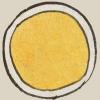cuexyo (Mdz49r)
This iconographic example of the cuexyo (or cuexyoh, with the glottal stop) design of a war shield (chimalli) is included here for comparative purposes. In Berdan and Anawalt, The Codex Mendoza (1992), vol. 1, Appendix G, this cuexyo design is the primary one, and they also provide four variants on it. The coloring of this one has a predominant yellow, along with green, red, and turquoise blue. It has long feathers as a fringe across the bottom. This classic cuexyo pattern has, within the main circle, a group of three nose ornaments (yacametztli) along the bottom and one at the top. Notes published in Mexicolore state that this is a Huaxtec design.
Stephanie Wood
The shields in hieroglyphs tend to be smaller and simpler (see below, right). This design (identified by Berdan and Anawalt, The Codex Mendoza, 1992, vol. 1, Appendix G) is found multiple times in the tributes lists of the Codex Mendoza. We have sampled other designs, as well. em>Cuexyo with the absolutive (cuexyotl) would be a noun, but here it seems to be modifying the noun for shield (chimalli), so it serves as an adjective.
una rrodela de plumas rricas desta divisa
una rodela de plumas ricas de esta divisa
Stephanie Wood
c. 1541, but by 1553 at the latest
war shields, escudos de guerra, rodelas, yaochimalli, chimalli, yacametztli, feathers, plumas
Codex Mendoza, folio 49 recto, https://digital.bodleian.ox.ac.uk/objects/2fea788e-2aa2-4f08-b6d9-648c00..., image 108 of 188.
Original manuscript is held by the Bodleian Libraries, University of Oxford, MS. Arch. Selden. A. 1; used here with the UK Creative Commons, “Attribution-NonCommercial-ShareAlike 3.0 License” (CC-BY-NC-SA 3.0)



